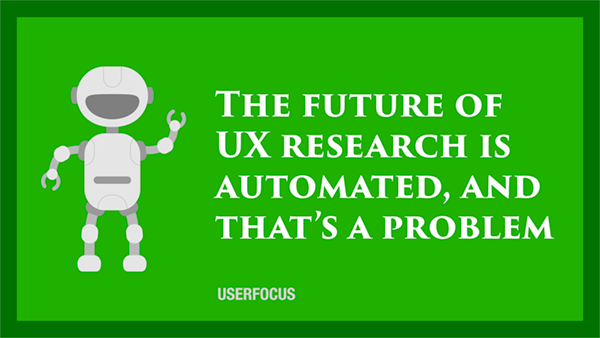
UX newsletter — August 2019

Email not displaying correctly? View it in your browser.
Message from the Editor
Over the Summer, I've been planning a series of online video training courses. I'm pleased with the content and the curriculum but there's one problem. I don't feel entirely natural in front of a camera.
I thought about avoiding the problem by creating voice-over-slides videos but I know from courses I've taken that this reduces engagement. So I've decided to practise my talking-in-front-of-a-camera skill by creating regular YouTube videos.
I try to keep these under 5 minutes and answer questions I'm commonly asked by my students. So far, I've answered questions such as:
If you'd like to follow me on my journey as I get more comfortable in front of the camera, or if you just want to watch me adopt the foetal position and die of anxiety, you'll find my YouTube channel here.
This month's article is about the future of UX research. I hope you find it useful.
— David Travis

If you compare the UX research methods we use today with the methods we used 16 years ago, something interesting emerges. We see that UX research is becoming increasingly remote and increasingly unmoderated. In other words, we're moving to a world where UX research is becoming automated. We can learn a lot from automated research. But it comes at the price of understanding our users. Read the article in full: The future of UX research is automated, and that's a problem.

A Masters in UX costs over £10k and may not make you more employable or attract a higher salary compared with spending the same time gaining practical experience in UX. Before you decide on taking that Masters degree, consider what you could achieve for 10% of the investment by creating an alternative, self-paced, personalised syllabus. Read the article in full: Do I need a Masters in User Experience?.
What we’re reading

Some interesting UX-related articles that got our attention over the last month:
Like these? Want more? View our posts on Twitter or Facebook.
Upcoming UX training courses
In this fun and hands-on training course, you'll practice all the key areas of UX — from interviewing your users through to prototyping and usability testing your designs — while you prepare for and take the BCS Foundation Certificate exam. Last few places. View the full syllabus: Foundation Certificate in User Experience.
UX quotation of the month
"If you think good design is expensive, you should look at the cost of bad design." — Ralf Speth.
Did I mention I've published a book?
It's titled Think Like a UX Researcher. Grab your copy here.
Hungry for more?
Read previous newsletters.
Want to receive your own copy of this newsletter?
Join our community of people interested in user experience. Sent monthly. No spam.
|